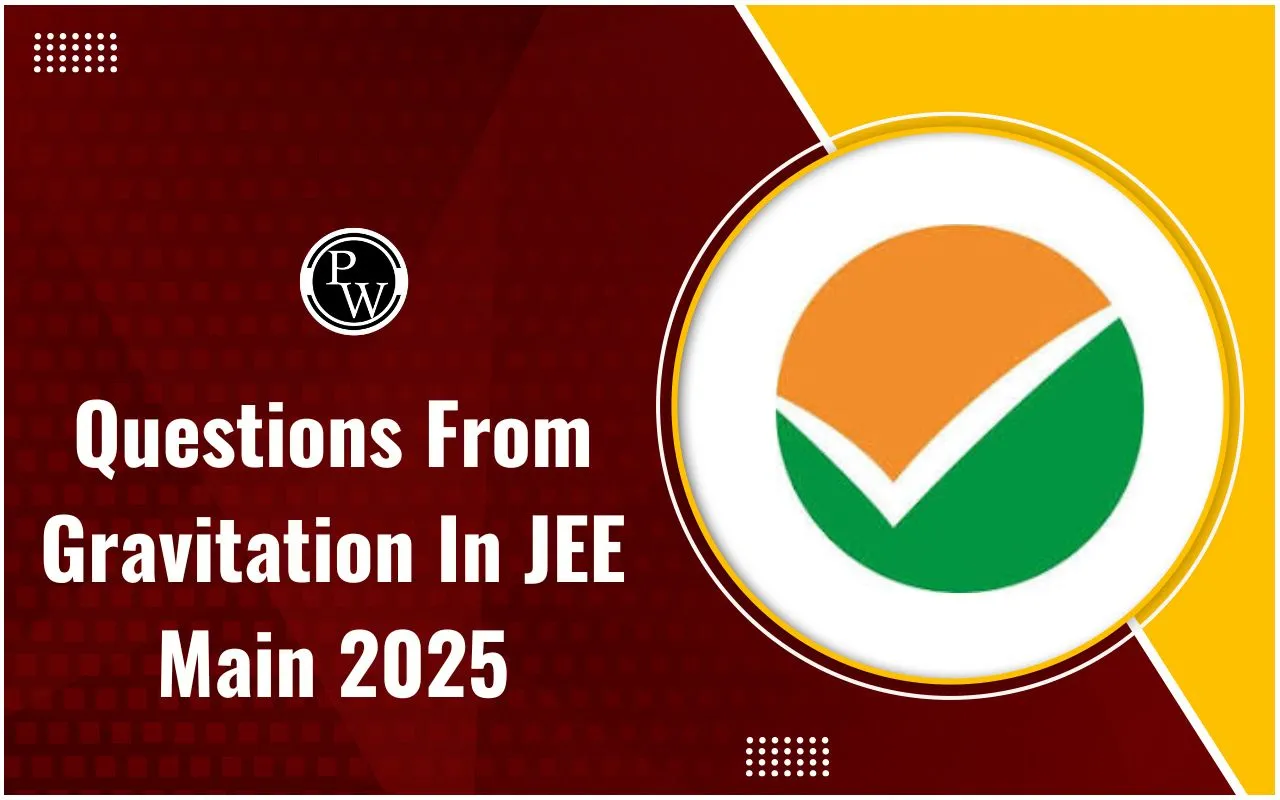
Expected Questions from Gravitation in JEE Main 2025 Session 2: Gravitation is one of the fundamental forces that govern the universe, influencing planetary motion, satellite dynamics, and even everyday phenomena like weight and tides. Gravitation plays an important role in Physics, forming connections with mechanics and celestial mechanics, making it an important topic for JEE Main.
In JEE Main 2025 Session 2, aspirants can expect questions based on Newton’s Law of Universal Gravitation, Kepler’s Laws, orbital motion, and energy calculations in gravitational fields. Mastering these concepts not only strengthens problem-solving skills but also helps in solving numerical and conceptual questions with confidence. To learn more about the expected questions from Gravitation in JEE Main 2025 Session 2, keep reading.
The Gravitation chapter has been an important part of the JEE Main Physics section every year. Based on past trends, around 7 to 10 questions can be expected from this chapter in the upcoming JEE Main 2025 Session 2. These questions often cover topics like Newton’s Law of Universal Gravitation, Kepler’s Laws, orbital motion, escape velocity, and energy in gravitational fields.
The Gravitation chapter has consistently appeared in the JEE Main Physics section, with the number of questions varying each year. Understanding past trends helps aspirants prepare better by identifying important topics and focusing on frequently asked concepts. Check out the number of questions based on Gravitation that appeared in the past examinations:
In the April 2024 session, a total of 13 questions were asked from Gravitation.
In the January 2024 session, the chapter contributed 10 questions to the exam.
In the April 2023 session, Gravitation had a high weightage with 21 questions.
In the January 2023 session, 18 questions were asked from this chapter.
In the July 2022 session, a total of 10 questions were included in the paper.
In the June 2022 session, the exam had 14 questions from Gravitation.
In the August 2021 session, only 7 questions were asked.
In the July 2021 session, Gravitation appeared in 9 questions.
In the March 2021 session, students had to answer 7 questions from this topic.
In the February 2021 session, the paper included 11 questions on Gravitation.
In the September 2020 session, there were 10 questions from this chapter.
In the January 2020 session, Gravitation was tested through 5 questions.
In the April 2019 session, the paper had 5 questions from this topic.
In the January 2019 session, students faced 9 questions from Gravitation.
Gravitation is expected to have a moderate weightage in the JEE Main April 2025 exam, contributing around 4-5% of the Physics section. This usually means one question from this chapter. It is a vital part of mechanics and plays a key role in understanding planetary motion, orbits, and gravitational fields. Questions from this chapter often focus on Newton’s Law of Gravitation, gravitational potential, and escape velocity. Along with Gravitation, other important topics in Physics for JEE Main include Kinematics, Laws of Motion, Work, Power & Energy, Rotational Motion, Electrostatics, Current Electricity, Optics, and Modern Physics. These topics also carry high weightage and must be given equal attention during preparation.
Gravitation covers concepts that are fundamental to understanding celestial mechanics and motion under gravity. To prepare effectively, aspirants should focus on conceptual clarity, problem-solving, and regular practice. Here are some key strategies to study Gravitation for JEE Main 2025 Session 2:
A clear understanding of basic principles is important for solving problems related to Gravitation. Some important topics include:
Universal Law of Gravitation: Learn the force equation and how it applies to planetary motion.
Gravitational Potential Energy: Understand its relation to work done and gravitational potential.
Escape Velocity: Know its formula and how it determines whether an object can leave a planet’s gravitational field.
Orbital Motion: Study circular motion concepts related to satellites and planetary orbits.
Kepler’s Laws: Understand the three laws that describe planetary motion.
Gravitational Potential and Field: Learn how gravitational force is distributed in space.
Gravitational and Inertial Mass: Differentiate between these two types of mass.
Weightlessness: Understand the conditions under which objects appear weightless.
Planetary and Satellite Motion: Analyze how planets and satellites move under gravity.
Tidal Forces: Learn about gravitational effects responsible for ocean tides.
Solve Different Types of Questions: Start with basic numerical problems before attempting complex ones.
Analyze Past JEE Papers: Solve JEE Main previous years' question papers to understand common patterns.
Revise derivations: Understanding formula derivations helps in solving conceptual problems.
Use Free Body Diagrams (FBDs): Drawing FBDs simplifies force analysis and improves problem-solving skills.
NCERT Textbooks: Build a strong foundation by covering all concepts from NCERT.
Reference Books: Utilize quality reference IIT JEE Books to gain deeper insights of concepts.
Online Classes and Study Material: Explore online JEE free classes provided by JEE Wallah for detailed explanations and problem-solving techniques.
Mock Tests: Take timed JEE Mock Tests to improve accuracy and speed.
Questions from Gravitation often require calculations related to gravitational force, potential energy, and satellite motion. Some questions may also test the understanding of how gravitational forces influence planetary and satellite motion. Additionally, gravitation-related problems can be linked with concepts from Circular Motion, the Work-Energy Theorem, and even Electrostatics due to the similarities in the inverse-square law. For students preparing for JEE 2026 and JEE 2027, the PW Power Batch offers a comprehensive study plan designed to help applicants strengthen their understanding of important topics such as Gravitation. With interactive live classes, a dual teacher model, and adaptive practice sessions, this batch helps aspirants enhance their JEE preparations.
